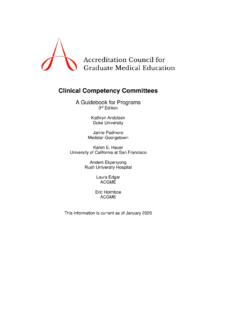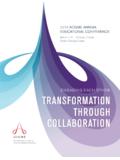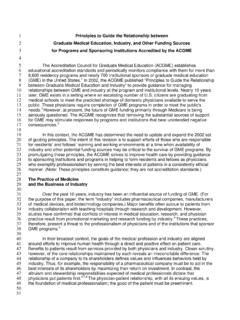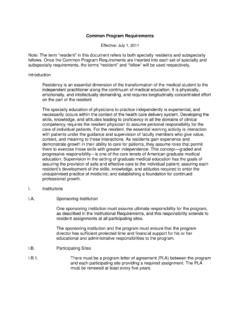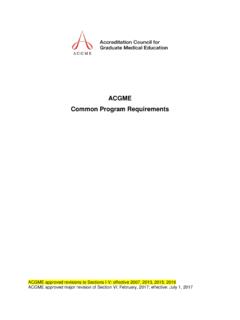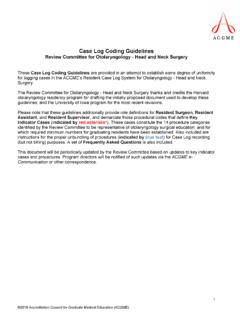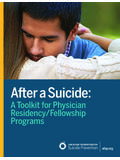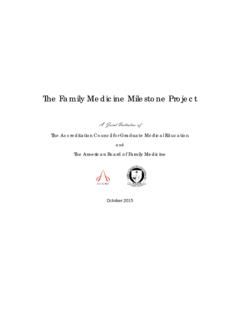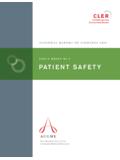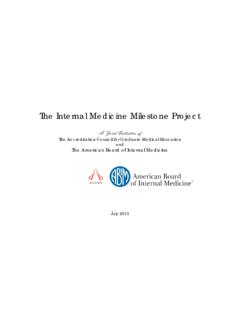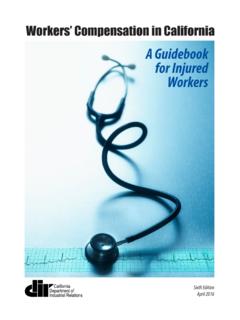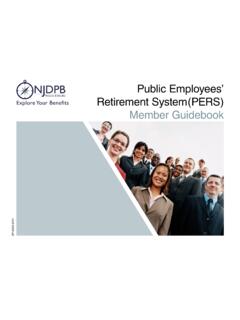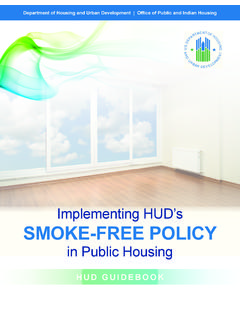Transcription of Milestones Guidebook for Residents and Fellows
1 2020 Accreditation Council for Graduate Medical Education (ACGME) Milestones Guidebook for Residents and Fellows Celeste Eno, PhD Ricardo Correa MD, EsD Nancy H Stewart, DO Jonathan Lim, MD Mary Elizabeth Westerman, MD Eric S. Holmboe, MD Laura Edgar, EdD 2020 Accreditation Council for Graduate Medical Education (ACGME) Table of Contents Section Page(s) Introduction 1 Summary Recommendations for Residents and Fellows 1 Competency-Based Medical Education 2-4 Milestones The 5 Ws 5-8 Assessment for Residents and Fellows 9-10 Resident/Fellow Feedback 11-13 Milestone Reports Available in ADS 14-15 Scenarios and Suggestions 16 Other Resources 17 1 2020 Accreditation Council for Graduate Medical Education (ACGME) INTRODUCTION Welcome to the second edition of the Milestones Guidebook for Residents and Fellows ! This Guidebook was written by the resident and fellow members of the ACGME s Milestones Development Working Groups to provide the learner perspective on what the Milestones represent and how they might be used to facilitate progress during residency/fellowship education and training.
2 Understanding the purpose and intent behind the Milestones will help Residents and Fellows have a background in how and why things are structured the way they are in graduate medical education. Residents and Fellows can also learn how the Milestones can be used to improve their abilities in medicine through constructive feedback and coaching. The key points to be discussed include: Competency-based medical education What the Milestones are and why are they important to you Assessment of Residents / Fellows by the program and subsequent reporting to the ACGME Giving and receiving feedback SUMMARY RECOMMENDATIONS FOR Residents AND Fellows 1. Be sure to review your specialty Milestones on an ongoing basis, especially at the start of each academic year, to help in your own professional development. 2. Perform a self-assessment twice a year around the same time your program s Clinical Competency Committee (CCC) meets.
3 3. Review and compare your self-assessment with the CCC s Milestone ratings with your program director, faculty advisor, or mentor. 4. Write an individualized learning plan at least twice a year, and discuss it with your program director, faculty advisor, or mentor. 5. Be an active participant in your regular assessment and feedback. 2 2020 Accreditation Council for Graduate Medical Education (ACGME) COMPETENCY-BASED MEDICAL EDUCATION (CBME) Key Points CBME uses key ability areas ( , the Competencies) to design curriculum and assessment of programs. Rather than being based on a specific amount of time required to reach certification, CBME focuses on reaching a standard level of competence for medical practice. content , progression, and assessment are based on the abilities an individual learner demonstrates. CBME creates a shared model for Residents , Fellows , faculty members, programs, accrediting bodies, and the public at large.
4 CBME allows for better feedback, coaching, and reflection for Residents and Fellows to create their own action plans for improvement. What is CBME? CBME has been used to educate Residents and Fellows , including the implementation of the Core Competencies and the Milestones . The literature defines CBME as, an outcomes-based approach to the design, implementation, assessment and evaluation of medical education programs, using an organizing framework of competencies (Frank et al. 2010). A competency describes a key set of abilities required for someone to do their job. For example, all future doctors must have a basic level of knowledge and ability to provide patient care. Without these critical skills, one could not perform their job. CBME aims for all graduating learners to achieve basic abilities in key areas to care for patients in practice. Residents , Fellows , and other physicians should be able to show they have obtained these abilities.
5 Notably, this is a different model from one where education and training are purely based on how many years you have completed ( , three years for internal medicine). A comparison of Traditional versus Competency-Based Medical Education Variable Traditional Educational Model CBME Driving force for curriculum Knowledge acquisition Knowledge application Driving force for process Teacher Learner Path of learning Hierarchal Non-hierarchical Responsibility of content Teacher Teacher and student Goal of educational encounter Knowledge and skill acquisition Knowledge and skill application Type of assessment tool Single assessment measure ( , test) Multiple assessment measures ( , direct observation) Assessment tool Proxy Authentic (mimics real profession) Setting for evaluation Removed In clinical and professional settings Timing of assessment Emphasis on summative Emphasis on formative Program completion Fixed time Variable time Adapted from Carraccio, 2002 3 2020 Accreditation Council for Graduate Medical Education (ACGME) Why CBME?
6 CBME is about ensuring doctors have attained an adequate level of skill or knowledge ( , abilities) in key areas important to the practice of medicine for a given specialty. This is critical to the safe care of patients as we ensure their future doctors can practice without the help of supervising attending physicians. CBME also aims to ensure that education and training have standard practices across institutions and programs throughout the United States. Using CBME as a framework centers the educational mission on the learner and what abilities that learner has obtained. Educational content , tools for feedback and assessment, and evaluation of programs in CBME are learner-centered and based on performance. Other evaluation systems often use Likert-type scales that rely too heavily on faculty members frames of reference and are more subject to rater bias. CBME emphasizes using evidence-based criteria to judge ability and relies more on directly observed behaviors and performance (demonstrated competence).
7 CBME rests on creating a shared roadmap for growth and progression during medical education and training. Ideally, this roadmap and shared model can be used by all important members of the educational program: the learners ( Residents , Fellows ), the teachers (faculty members, program leadership), and accrediting bodies (the ACGME). Creating public transparency about the Core Competencies and the roadmap of growth also promotes trust and clarity with patients and the public as they enter the care of Residents and Fellows . How Has CBME Been Implemented in Medical Education? What Is it to Me? The Core Competencies The ACGME and the American Board of Medical Specialties developed the six Core Competencies necessary for a practicing physician: Patient Care and Procedural Skills Medical Knowledge Practice-based Learning and Improvement Interpersonal and Communication Skills Professionalism Systems-based Practice Just like a standardized physical exam may use an anatomic approach, the Core Competencies provide a systematic framework to think about both curriculum and assessment in medical education.
8 Each specialty was tasked with crafting specific Milestones within each Competency. We will dive further into the Milestones in the next section. 4 2020 Accreditation Council for Graduate Medical Education (ACGME) References Carraccio, Carol, Susan D. Wolfsthal, Robert Englander, Kevin Ferentz, and Christine Martin. 2002. Shifting Paradigms: From Flexner to Competencies. Academic Medicine 77, no. 5: 361-367. Elam, Stanley. 1971. Performance-Based Teacher Education: What is the State of the Art? Washington DC: American Association of Colleges of Teacher Education. Frank, Jason R., Linda S. Snell, Olle Ten Cate, Eric S. Holmboe, Carol Carraccio, Susan R. Swing, Peter Harris, Nicholas J. Glasgow, Craig Campbell, Deepak Dath, et al. 2010. Competency- Based Medical Education: Theory to Practice. Medical Teacher 32, no. 8: 638-645. Holmboe, Eric S., Jonathan Sherbino D. Michael Long, Susan R. Swing, and Jason R.
9 Frank. 2010. The Role of Assessment in Competency-Based Medical Education. Medical Teacher 32, no. 8: 676-682. Kogan, Jennifer R., and Eric S. Holmboe. 2013. Realizing the Promise and Importance of Performance-Based Assessment. Teaching and Learning in Medicine 25 (Suppl 1): S68-74. McGaghie, William C., Abdul W. Sajid, George Edward Miller, and Thomas V. Telder. 1978. Competency-Based Curriculum Development in Medical Education: An Introduction. Public Health Papers 68: 11-91. Nasca, Thomas J., Ingrid Philibert, Timothy Brigham, and Timothy C. Flynn. 2012. The Next GME Accreditation System Rationale and Benefits. New England Journal of Medicine 366, no. 11: 1051-1056. Weiss, Kevin B., James P. Bagian, and Thomas J. Nasca. 2013. The Clinical Learning Environment: The Foundation of Graduate Medical Education. Journal of American Medical Association 309, no. 16: 1687-1688. 5 2020 Accreditation Council for Graduate Medical Education (ACGME) Milestones .
10 WHAT YOU NEED TO KNOW Key Points Milestones Describe the development of specific skills, knowledge, and attitudes ( , abilities) organized within the six Core Competencies through the course of education in a specialty/subspecialty Represent a shared model for how a resident/fellow can get to the next stage towards mastery Created for patients, Residents and Fellows , faculty members, program leadership, and accrediting and specialty organizations Assessed through peer and health professions faculty members (including non-physicians) assessments and synthesized by the Clinical Competency Committee before submission to the ACGME Written by key stakeholders and revised after public comment The Milestones Are a Roadmap for Growth and Development during Residency/Fellowship The Milestones represent a roadmap for the development of Residents and Fellows as they advance in clinical skills, knowledge, and values.
